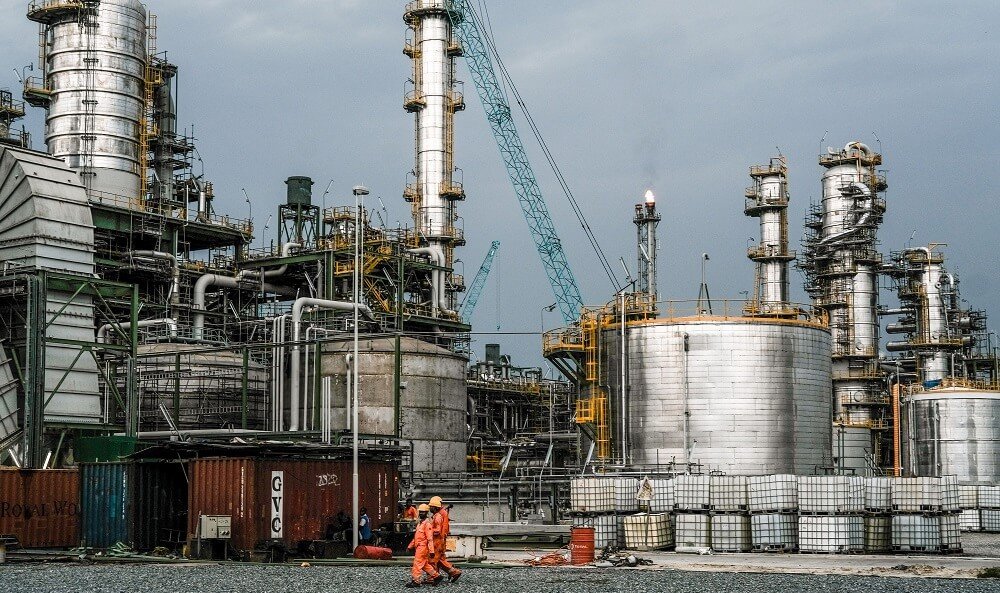Oil Expert has debunked claims that Dangote Refinery is importing substandard fuel with high-sulphur.
NewsOnline Nigeria reports that oil and gas expert Kelvin Emmanuel has debunked reports alleging that the Dangote Refinery imported high-sulphur petrol into Nigeria, describing the claims as baseless propaganda aimed at discrediting the $20 billion facility.
His response follows media reports that a vessel, MT Clearocean Mary, allegedly arrived at the refinery’s offshore terminal on October 9, 2025, with 37,000 metric tonnes of petrol containing 690 parts per million (ppm) of sulphur, far above Nigeria’s 50ppm clean fuel limit.
ALSO: Minister Umahi Challenges Governor Makinde to Engineering Debate Over Coastal Highway Remarks
The report, citing data from shipping sources, claimed the product was loaded from Phillips 66 Refinery in the United Kingdom and suggested Dangote was importing “dirty petrol” while branding it as locally refined fuel.
Speaking on ARISE Television on Sunday, Emmanuel clarified that the cargo in question was not finished petrol, but intermediate feedstock, a raw refining material known as high catalytic sulphur gasoline and straight-run naphtha.
“This is a global refining standard, not a malpractice,” he explained. “Refineries in countries like Malaysia, Singapore, China, India, the UK, Saudi Arabia, and the UAE import similar feedstock to process through the Residue Fluid Catalytic Cracking Unit (RFCC) into ultra-low sulphur petrol and diesel.”
He said it was misleading to portray the import as substandard petrol, stressing that “refineries all over the world import intermediate materials to refine further, it’s part of the production chain.”
Emmanuel faulted the Nigerian Midstream and Downstream Petroleum Regulatory Authority (NMDPRA) for not immediately clarifying the issue, saying the regulator’s failure stemmed from its lack of a standard testing laboratory as required under the Petroleum Industry Act (PIA).
“Sections 29 to 52 of the Act mandate the NMDPRA to maintain laboratories equipped to test sulphur limits, distillation levels and density using ASTM standards,” he said. “If such a lab existed, it would have tested the product and dispelled this misinformation instantly.”
He further stated that Dangote’s products meet and even surpass Nigeria’s 50ppm sulphur benchmark, noting that the refinery recently exported petrol to the United States with a sulphur content between 30 and 60ppm, well below Nigeria’s limit.
“The petrol exported to the US had about 44–46% lower sulphur than Nigeria’s standard, proof of its quality and global competitiveness,” he said.
Commending the Nigerian Upstream Petroleum Regulatory Commission (NUPRC), Emmanuel highlighted progress in stabilising crude production and expanding reserves through advanced 3D and 4D seismic data.
He referenced the $5 billion Bonga North Final Investment Decision (FID) as an example of data-driven success in oil exploration, achieved without new drilling.
Emmanuel also praised the implementation of the Host Communities Development Trust and the hydrocarbon accounting framework, which he said had improved real-time production data and transparency across the oil value chain.
He urged the Federal Government to convert Nigeria’s domestic crude allocation of 445,000 barrels per day into a strategic reserve, separate from the OPEC quota, to guarantee steady supply to local refineries like Dangote’s and enhance energy security.
Finally, he called for better policy coordination among the Central Bank of Nigeria (CBN), Finance Ministry, and Petroleum Ministry, saying such synergy would improve fiscal transparency and ensure accurate reporting in the nation’s oil and gas sector.














